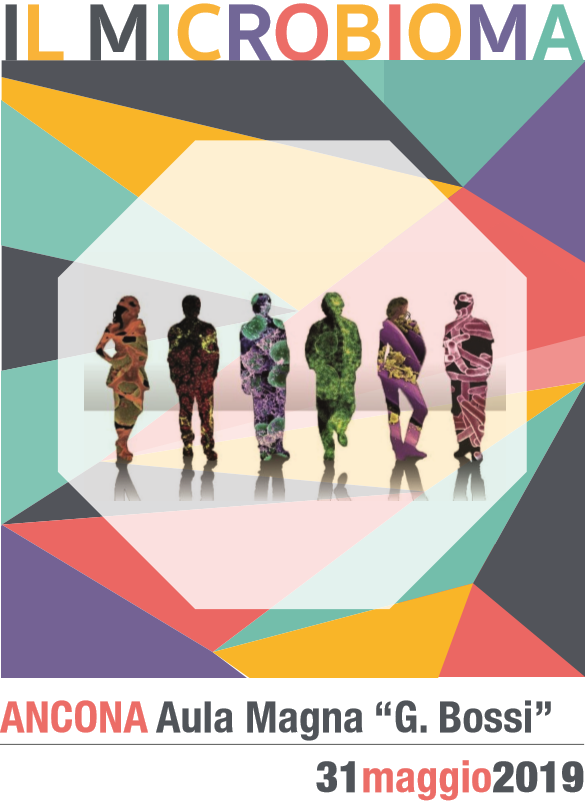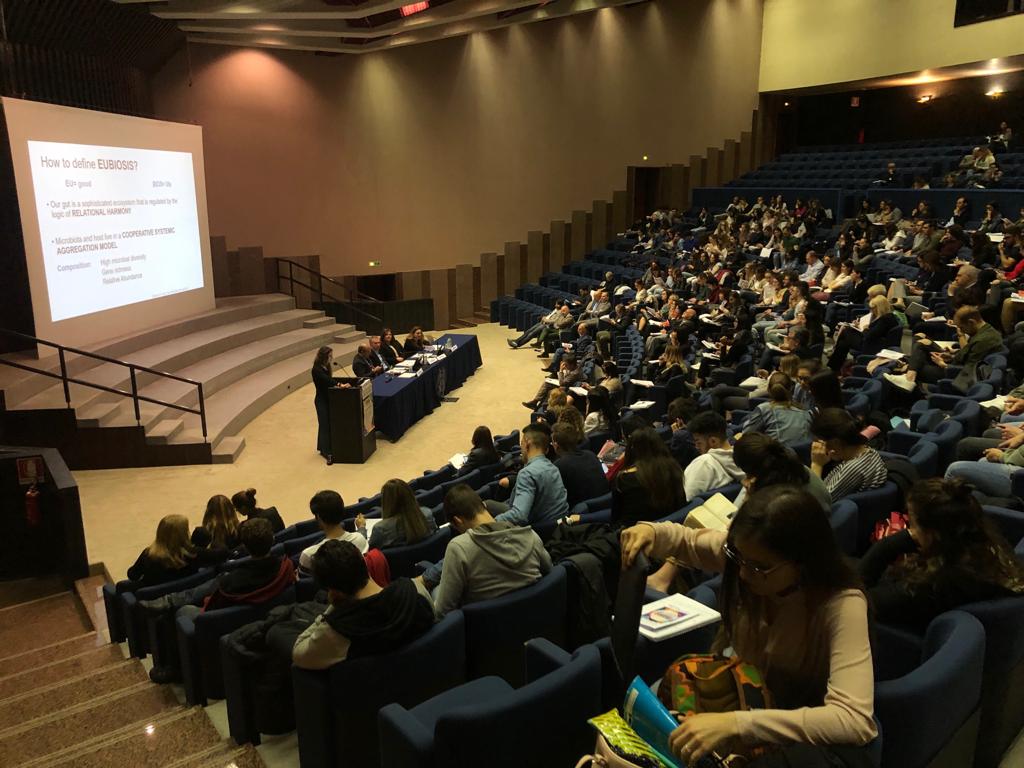
A conference on the microbiome was held at the Polytechnic University of Marche (UnivPM), Ancona, on May 31, 2019, with support from the FEBS Science and Society Committee. The conference was co-organized by the Italian Society of Biochemistry and Molecular Biology (SIB), UnivPM, the AOU Ospedali Riuniti di Ancona, and the Ordine dei Medici Chirurghi e degli Odontoiatri di Ancona. The sponsors of the event were: Mytho, Errekappa, Metagenics, Omeopiacenza, Penta and Named. The conference was awarded 5 points of continuous education for all medical disciplines.
Prof. Laura Mazzanti, honorary President of the conference, was responsible for opening the event. The conference was also addressed by the mayor of Ancona, representatives of the co-organizers, and the current and former presidents of the SIB, Prof. Raffaele Porta and Prof. Mauro Magnani, respectively. Prof. Raffaele Porta is also a delegate of the FEBS Science and Society Committee.
The full program of the event can be seen here.
The workshop was attended by approximately 400 people, including about 300 biomedical scientists, medical doctors and university students, and approximately 60 PhD students and resident medical doctors. Around 40 lay people also attended and commented that the presentations were very informative, interesting and easy to follow. This type of mixed audience is pertinent to the causes of the FEBS Science and Society Committee, which aims to promote biomedical science to the wider society.

The main topics of the morning session revolved around the role of the microbiome in pregnancy and newborns, with a special focus on preterm birth, in which the vaginal microbiome and its clasterization could be useful in recognizing the obstetric population at risk. Celiac disease, and the dysbiosis that has been demonstrated in patients with this disease compared to healthy subjects, was another topic of discussion at the conference. Remaining on the topic of children and the microbiome, there was a talk about pediatric onco-hematology and the role that intestinal microbiota plays in deciding the post-transplantation of bone marrow in pediatric patients. In the later sessions, the talks shifted focus towards the elderly and the problem of inflammation that, if left unchecked, can contribute to the onset of serious diseases and premature aging, characterized by fragility and sarcopenia. Emphasis was placed on the fact that the microbiome of our gastrointestinal tract cooperates with human metabolism, for example in the transformation of drugs, nutrients and vitamins for catabolic/excretory or bioactivation purposes.
All these morning speeches were followed by a lively discussion from the audience. The main questions that arose were with regards to some problems reported by the most recent publications suggesting possible practical solutions that could help improve the metabolic outcome of both the mother and the child. In fact, it was pointed out that although literature data are not always unambiguous, vaginal dysbiosis appears to be implicated in more than 40% of cases of prematurity. Regarding the child, the concerns that arose were involved with the increase in the prevalence of celiac disease. The speaker pointed out that numerous environmental factors are probably involved (nutrition, use of antibiotics in early childhood, breastfeeding, intestinal infections and gluten quality). It was hypothesized that perhaps all these environmental factors might act by modifying the intestinal microbiome, which has a fundamental role in maintaining intestinal homeostasis. Also concerning children, an intense discussion was related to the bone marrow transplantation of pediatric patients because studies revealed that the microbiota can influence the chances of success.
The discussion then moved on to all the problems associated with dysbiosis, fatty liver or antibiotic therapy, in their adverse role on metabolism and on the function of fat-soluble vitamins such as vitamin D and E; such liposoluble vitamins have an important role in ensuring good control of the immune response and processes of protection and regeneration/repair of tissues during exposure to stress conditions and in aging processes. The regulation of the inflammatory state can also occur through the intestinal microbiota, which acts on the immune system in different ways.
In the afternoon session, the main topics were focused on the link between intestinal dysbiosis and weight loss in the fight against obesity. Important concerns were raised regarding the role played by the oral microbiota in the onset and clinical course of various human diseases, whether they are located in the oral cavity (periodontitis) or in the whole organism (diabetes). There is a serious association between dysbiosis, metabolic syndrome and liver disease. In the final sessions of the conference we entered the world of probiotics – microbes that can be used as a food supplement, for example, in chocolate bars.
The afternoon sessions were also followed by animated discussions from the audience. The main topics discussed by the participants were related to the composition and function of the intestinal microbiota in association with metabolic disorders, such as obesity, insulin resistance, and Type 2 diabetes. All the speakers agreed that modification of the intestinal microbiota, through the administration of prebiotics (already present in food or added as ingredients) and probiotics, reduces low-grade intestinal inflammation and improves the integrity of the intestinal barrier itself, thus favoring metabolic balance and promoting weight reduction. A rather original way to administer these microbes is through the chocolate bar that has numerous characteristics suitable for this purpose.
The conclusions of the event were summarized by Prof. Laura Mazzanti, Prof. Monica Emanuelli and Dr. Arianna Vignini. Taken together, the presentations confirmed that studies on the microbiome have greatly contributed to recent advances in understanding the pathogenesis of a wide range of human diseases. And as is now commonly known, it is better to prevent than to treat, both from the point of view of the patient and of the national health services.
The event received significant attention and merited space on the UnivPM, SIB, and Continuing Medical Education (CME) provider websites.
Dr Arianna Vignini
Chairman and organizer of the Ancona Conference on the Microbiome
Researcher in Biochemistry and Nutrition Specialist
Polytechnic University of Marche





Join the FEBS Network today
Joining the FEBS Network’s molecular life sciences community enables you to access special content on the site, present your profile, 'follow' contributors, 'comment' on and 'like' content, post your own content, and set up a tailored email digest for updates.